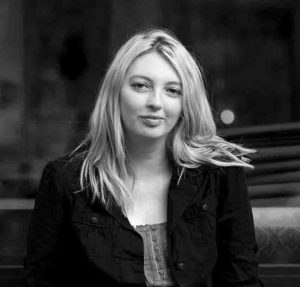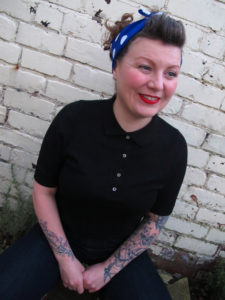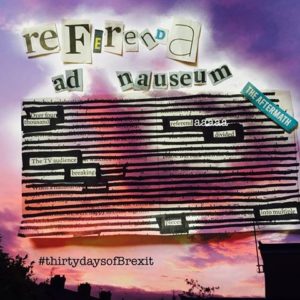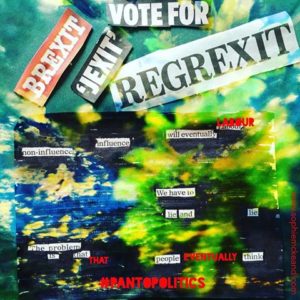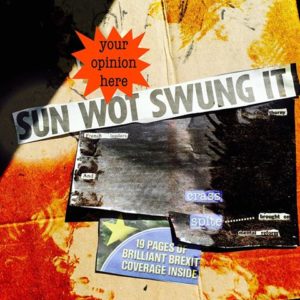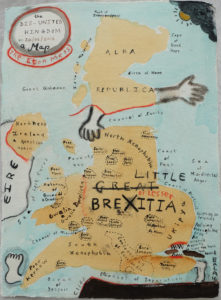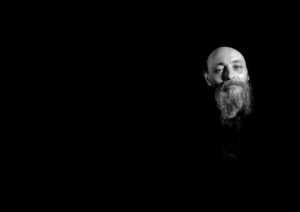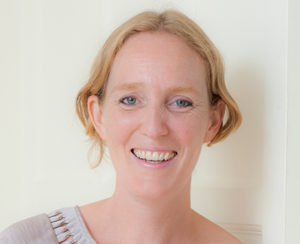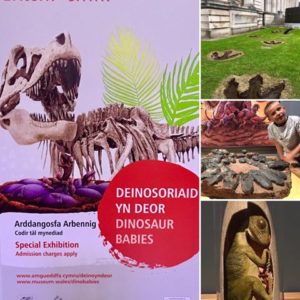
 (5 / 5)
(5 / 5)
If you want an adventure with history this summer then step back in time and visit the National Museum Cardiff to experience their wonderful new exhibition – Dinosaur Babies.
The exhibits, many discovered in China, are on loan from the United States of America and have never been on public display in the UK before.
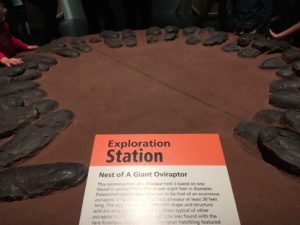
As you immerse yourself in the lost world of the dinosaurs you will come face to face with many familiar dinosaurs and others not so. The breath taking skeletons are brought to life by the many wonderful colour illustrations by Luis V. Rey, who working alongside the palaeontologists involved with the research of these dinosaurs, has given us visual imagery for the creatures we are walking amongst and a clear depiction of what they and their environment may have looked like when they walked the earth.
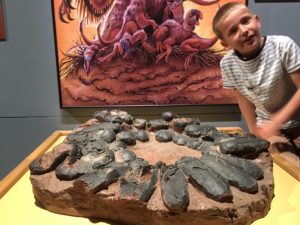
This exhibition has been specifically designed to be child friendly and it has certainly achieved its aim. There are a range of activities that engage the visitor whatever their age and the wealth of information is staggering.
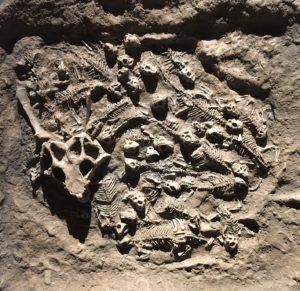
Dinosaur Babies will enthral, enlighten and educate, as you venture into the never before seen world of motherhood amount these fascinating creatures. There are nests, eggs and even embryos intact inside their shells, a sight that will awaken the curiosity in everyone, alongside a desire to learn more.
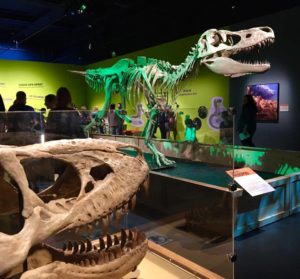
The discovery of these dinosaurs in their many family groups has enabled scientists to build up a more comprehensive picture than ever before. They are able to establish a better idea and understanding of how these magnificent creatures lived in social groups and how they nurtured their young and now for the first time we are able to join them on this journey.
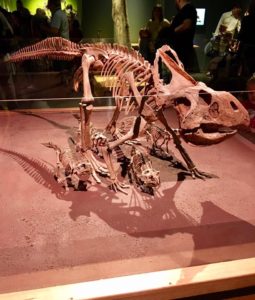
For the younger visitors there is a range of activities that will suit any age, whether it is conducting your own mini archaeological dig to find fossils, dressing up as a dinosaur or creating an art work to take home as a reminder of what you have seen.
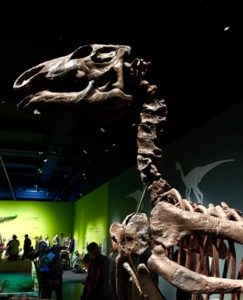
This really is a great exhibition that caters for the whole family. Whatever your age or level of interest in dinosaurs, you are guaranteed to take away a wonderful Natural History Experience that you’ll be talking about all summer.
This exhibition forms part of Wales’ Year of Legends and runs from 27 May – 5 November
https://museum.wales/cardiff/whatson/9487/Dinosaur-Babies/
Tag Archives: National Museum wales
“Which is why I am writing this” Creatives and critics on the EU referendum
I have been shocked and dismayed by Thursday’s vote in which just over half of the British public expressed their desire to leave the EU. As a theater maker working with marginalised groups, much of the funding of organisations we come into contact with- organisations, which support the most marginalised and disenfranchised among us-, comes from EU pots.
The aim of Taking a Flight is to provide employment opportunities for Deaf, disabled and sensory impaired performers. Whilst I don’t anticipate that the government of the day would reverse laws and Acts which have already been passed to protect the rights of disabled people, I fear that, with the UK’s poor track record for supporting disabled people and protecting funding and support, that the UK will begin to lag behind Europe in this- and many other areas. This will happen.
My immediate response of panic has been much more personal, as I feel already there has been a paradigm shift in the attitude of many people towards “the other”-I have heard in the street, on social media and on the news, Joe Public using the result of this referendum as an excuse to be overtly, unashamedly and publicly racist. It feels as if this referendum has opened the door for the metaphorical tattooing of the bulldog on the forehead and the waving of the Union Jack in the faces of those who remain supporters of membership of the EU- and those perceived as “other”.
Lastly, I am disappointed at the number of people who appear to have voted “leave” in error- who decided to vote against the government – a protest vote which has cost us- and our children- dearly.
I wish I could share the “lets make the best of it” attitude- that the best art is inspired by diversity, but I’m afraid that with so many of my friends of European origin already planning to leave, and so many friends speaking of “winding up” all their EU contracts, with the pound at an 31 year low and the threat of further knocks to the industry I love and make my living- such as if us- at, I cannot bring myself to optimism at this point.
James Doyle-Roberts (Co-Artistic Director, Citrus Arts based in Pontypridd)
On the day of the result I was in a cheap hotel room next to London City Airport. The social housing estate next door is soon to be demolished to make way for yet more tiny 1-bedroom flats which claim to be “luxury” (as they always do), and will temporarily house workers rather than families, until they can’t afford to live there anymore.
This is how economic “growth” works, and is why I’m on the side of the social benefits that the EU delivers in our communities in Wales where it invests in apprenticeships, tourism and communities, so they can keep their shared spaces connected to their sense of self. And yes, that includes people who come from abroad who want to contribute to those communities.
At 6 am that morning, I woke up with the referendum result already in my mind. I checked my phone, and my heart sank into an empty-feeling stomach.
I’d already voted to Remain without a moment of doubt; I still respect some friends who have sound ideological reasons to distrust the EU’s current state, but don’t think their global revolution is coming soon and know a better bet on our current future when I see one.
The last thing I saw on TV the night before was the early Sunderland result declared alongside footage of cheering Leave supporters. This clip was different to the usual election results being declared to a band of victorious party-faithful, this was the kind of cheer we’d all seen in earlier weeks of the violence that accompanied the opening games of Euro 2016, it was cheering with anger and a F**k You attitude– the worst kind of victory cry.
I went downstairs to the breakfast room to see a man in his 50’s cheering loudly every time Johnson or Farage appeared on the TV above the heads of an international mix of fellow guests and staff. He’d clearly been having his own all-night Brexit party, surrounded by empty bottles and was enjoying himself by loudly addressing the staff (mostly non-white), in that particular smirking, dismissive, ‘you-know-what-I-mean’ way that the odious Farage has normalised into our political discourse in the past eight years.
I was being paid a small amount of money to attend Greenwich & Docklands International Festival (GDIF) and the networking events around it. Alongside my thoughts asking “what’s the point of going, now we have the repercussions of this terrible result to deal with?” I was also thinking “and so, here it begins . . .”, as I left Bully-Boy to his ugly antics.
The lump in my throat grew each time I thought of the future of my little boy, 19 months old, growing up in a society where facts and expertise become disposable when pitted against volume and vitriol. What kind of society are we allowing our media to shape where honesty and propriety are represented as just “one side of the argument”?
At the GDIF Marketplace event (where artists can meet programmers from around the world to sell our shows), the atmosphere was how I imagine a wedding party to be where the Bride or Groom have bolted, but the guests decide to stay to consume the food & drink anyway because it’s all been paid for. There was no banquet on offer, just opportunities to build relationships with fellow artists around Europe and the wider world, and chances for us to make the best of the funds we could collectively gather between us if we cooperate.
Speakers welled-up & choked as they tried to contextualise why we were all there. Scottish delegates had confidence that they would go their own way, anyway; I felt like apologising for Wales’ strong vote to leave the EU.
There is still hope for a way out of what looks like an ugly future, but without any current leaders with the integrity to step-up & confront the lies, it is up to us to build it together by talking to each other, our neighbours, the people we randomly meet, and not being afraid of Bully-Boy and his gang.
Rachel Tresize Author and Playwright
I’m absolutely devastated by the referendum results, not least here in my own Rhondda Valley where residents have benefited from so much EU funding in the past. I studied on an Erasmus scheme when I was twenty years old. It was such an inspiring experience to meet and study with so many students from all over the world and inimitable in introducing me to the world outside of my own area. As a writer I travel frequently to EU countries and am translated in Danish, Italian, Croatian and soon Slovenian and I would like young Welsh students and authors to have these same opportunities. I’m worried now that these ties will be severed due to financial and travel restrictions.
Gemma Louise Treharne-Foose Get the Chance Critic
I’ve been a lucky recipient of EU-funded programmes over the years. I had a paid for apprenticeship after University to train as a researcher in TV production because I lived in the valleys. I have been happy to take advantage of the programmes and funding available to me because of my postcode and because people think I need a ‘leg up’ or a head start. But these programmes and funding pools are a sticking plaster for the real problems going on in the valleys. Long term unemployment, dreadful infrastructure and crumbling services. I’ve had lots of conversations with others living here that it’s ridiculous that in 2015/2016 we are still relying on charity handouts – whether they are from Westminster, Cardiff Bay or Brussels.
I think the remain campaign never really addressed this malaise and the deeper frustrations and resentment, unfortunately. I fear for how much worse things will be here now. EU-funded projects were the only thing helping people back to work in many areas in RCT as UK-Govt services (like Job centres) have ceased or been closed down. As much as I agree with the reasons to remain, I have struggled to articulate to friends and colleagues from wealthier and more prosperous communities why people here aren’t jumping up and down and doffing their cap because of handouts from the EU. I think there’ll be some harsher realities coming our way, though.
Sophie McKeand Welsh Poet Young People’s Laureate Wales 2016-2018
I’ve chosen to respond to the Brexit debacle by creating blackout/cutup poems every day for thirty days using only that day’s papers using the hashtag #thirtydaysofBrexit. These are protest poems in response to the right-wing media bias we’ve all been subjected to.
This needs challenging, questioning and changing dramatically. Our media is homogenised and overtly right-wing which is why Jeremy Corbyn is getting such a roasting.
I personally believe he is, hated by the political and media establishment, the underdog the British public will get behind in the future. We’re sick of cock-swinging politics and many like his quiet socialism, his let’s-have-tea-with-your-nan approach. I think he is someone who could reach out to Plaid Cymru, the SNP and Northern Ireland, creating a united group of countries.
https://www.instagram.com/sophie_mckeand/
Iwan Bala Visual Artist
Keith Murrell Community Artist
I should preface my response by saying that I didn’t vote
I’m not registered at the moment because I have no permanent address – I know there is still an option to register but I don’t feel like sharing my personal circumstances with the bureaucracy. Having said that: I’ve never been overly engaged with the ‘democratic process’ and have very little (none) faith in the political party system – I’ve only voted a couple of times in my life and that was about issues rather ideologies … at the previous general election I voted ‘Green’ not because I thought they could win but in order to show support and help them to keep their deposit. Had I been registered this time around I would have voted to remain: this in itself is more of an instinctive reaction to the politics of those who want to leave, rather than any shining virtues of the EU.
I personally have little regard for ‘national identity’, borders, or flags and I tend to think more in terms of community and the planet. In that respect, I’d find it more plausible to think of myself as a citizen of an actual place (i.e. Europe) than being a subject in some archaic theme park called GB, UK or whatever it might say on the vellum.
In practical terms: I think the EU is of great value with regards to the advancement of things such as Human Rights, Employment Law and Environmental issues, etc. On the other hand, I’m not particularly enamoured about the impact of European funding for ‘socially targeted’ projects. Having worked on several such projects with a total value of several £millions I witnessed most of that money being directed towards vested interests more than improving the communities intended… and at worst Euro funding has been used to disrupt, dis-empower and displace communities… Butetown has had more than £1billion of EU money and where is it now?
Outside of Cardiff – the areas of Wales which receive the most EU funding voted to leave and irrespective of the politics behind the individual votes this must be seen as indictment of the public and voluntary sector in the delivering the EU programme.
With regards to the political campaigns the apparent choice was between buffoons and liars (clowns to left, jokers to the right …) I didn’t hear anything convincing from either side but then again I wasn’t paying much attention.
Regardless, I reckon the high turnout was due to the media hyperbole rather than any actual knowledge of or even interest in the EU … it’s quite bizarre to think that people might be more concerned about the goings on in Brussels than their own Town Hall.
In the event, I was a little surprised – and disappointed – with the result: mainly because it demonstrates the prevalence of such retrogressive attitudes – and might encourage / permit more people to think more along these lines. Then again, it seems that there was a generational factor in the voting with the implication that the younger people think differently and in time they will lead the debate – if losing this referendum mobilise young people then that will be a good thing …
But my Facebook timeline was inundated with angry / fearful posts about the future without the EU – and my response was “it’s actually not that bad” …
The media, pundits, etc have great fondness for using terms like ‘historic’, ‘pivotal’ and ‘once in a lifetime’ because it makes their role in the affair all the more important – every major political, sporting or scientific event is presented this way – and the public buys it because it makes their lives seem less mundane – but in reality nobody is interested in history but historians: you couldn’t go into into your local pub or corner shop and hear about the economic impact of the Versaille Treaty – very few people in Wales were preoccupied with Wales’ history in the European Championships until the TV reminded us and if Wales should actually win it will pale into insignificance in little more than a decade
I don’t claim to know anything about macro-economics (which makes me better informed than most) but I do know that the actual economy has very little to do with elections (although I will also say that every penny earned and spent is a vote cast)
I personally don’t have any property, investments or pension to speak of and I have quite a low maintenance lifestyle – so market shifts mean little to me – but for those that have those concerns I would say that ‘there is many a slip between cup and lip’ so there will always be the potential that they could lose out but similarly there’s about as much chance that the pendulum will swing and at some point they may be ahead – and this has been the case from the Bible to Barings Bank
I don’t have a passport and have never travelled outside of Wales & England – so again the whole notion of passports, visas, etc has little impact on me directly – but I don’t know that I would be too bothered about filling in some forms if I wanted to visit somewhere that badly – and perhaps people should travel around Wales a bit more 🙂
Dr Emily Garside
I am sad, I am angry, I am disappointed. Above all I am frustrated. Frustrated with the politicians who led us to here, with the media who helped further campaigns fought on little or misinformation. And I’m frustrated with those who say because it was a ‘democratic’ vote we must all sit back and quietly accept the decision. I accept that the vote was democratic, I accept people’s right to vote Leave. I don’t have to be happy about it. Thatcher was elected democratically and I’m still angry with that, and the implications of what she did while in office. And much like what Thatcher’s government did to this country, to the poorest areas and to the arts, I fear that the decision to leave Europe will be felt for generations to come. And much like in Thatcher’s reign, Wales is a place where the hits will be felt hardest.
In Wales you really don’t have to look far to see one of those little signs with the European flag that let you know the building that was repaired, the social space rebuilt or the arts centre allowed to continue is still there because of European funding. So much of Wales has been rebuilt in literal and cultural terms by the EU, and that so many areas, so many voters let xenophobic notions and unfounded immigration fears blind them to that scares me.
I fear for our artists and our art. I fear for the millions in lost funding that the arts in all their forms are reliant on. Wales has always been outward facing in it’s art. We invite the world to share our stages for Eisteddfod every year. We hold festivals that people travel to from the world over. And we collaborate, we share, we create. It’s in our very nature as a nation of artists. And it is this loss of collaboration I fear most. When paperwork halts free movement, when isolationism means the hurdles are too great to overcome to collaborate and yes, when we no longer have access to the funding we do now, because we cut ourselves off.
It seems reductive, gauche even to reduce my fears about arts in Wales to funding and travel, but these are the vital tools that give our arts life. In cutting off the vital lifeline of European funding, and building barriers to ease of travel to share what work we can still create, what then? I think of all the work unmade, the opportunities not shared, and it breaks my heart.
The ‘leave’ campaign seems to be fought and now won on a backward looking attitude, a yearning for a country that in fact never was. If we look at Wales before EU funding we were crumbling, our arts were suffering. There are no ‘good old days’ to go back to. What an open Europe has done is open the doors to collaboration, to inspiration and to forward thinking, forward motion. To quote Tony Kushner ‘The world only spins forward’, and yet we seem to have voted to try and stop.
What now? That’s the question isn’t it. When you (democratically) vote in a government you know roughly what’s coming, for better or worse. You know policies, personalities and in four years you have the hope that they’ll be gone. Europe is a leap in the dark. The fear is real because the answer to the question of ‘what now?’ is ‘nobody knows’.
The most anger I feel is towards those who tell us all to ‘just calm down’ as if this was a bad football score (not that I hope to jinx Wales’ chances, football is about the only ray of hope I can see right now, and I don’t even like the sport!). But maybe there’s hope in that. In the anger. If there’s one thing the arts does well it’s respond to crisis. And that is where I do have hope. I have hope in the voices of the artists, and will of the arts companies to keep fighting. To keep working however we can.
Yvonne Murphy Omidaze Productions
The referendum result is not binding. It is advisory. Parliament is not bound to commit itself in that same direction. I do not believe the referendum was managed in a fair and democratic way and since the Leave campaign spoke so highly of sovereignty I wish British Parliament to enact it’s sovereign right in overruling the referendum result in the best interests of Britain and ALL its people and its future generations.
And so I have launched a petition. Here is the wording:
Sovereign British Parliament to debate EU referendum result & vote to overrule.
The British Parliament is sovereign and it is accountable to the people through elections at which we choose those whom we want to represent us, NOT through referendums. MPs are our representatives & are there to decide what, in their judgement, is good for us and the country.
Many Leave voters placed a vote of protest against a range of things not connected to the EU, from austerity cuts, to rising inequality in Britain without actually understanding the facts or the full implication of their vote. This is why we elect MPs in our democratic country to make these decisions. e.g capital punishment was thankfully abolished in the 60’s although a clear majority of the population remained in favour of it. The nearly 50% of the population who voted remain need a hearing.
It takes a few days for a petition to parliament to be processed and approved. So while I wait for that to happen I have written this article/blog. The petition circulating and gathering millions of votes asking for a second referendum (which I signed) was started in May by a Leave campaigner worried that we would get a Remain result! I do not particularly want a second referendum. I want parliament to deal with this. I didn’t want a referendum in the first place. Nor did at least half the country. So why did we have one?
We had a referendum because David Cameron took a high risk strategy with our country’s future to appease the right wing bullies in his party, to silence UKIP and stop the migration of Tory MPs to that party. He took that risk because he did not for one moment think the country would vote out. Even the man who ran against him (Boris) did not for one moment think we should leave (which is why he is now furiously back peddling) he simply wanted to ‘play the game’ and raise his profile so he could go for leadership next time round. The Co-leader of the Leave campaign Iain Duncan-Smith in a interview on Friday called the result ‘startling’ not once but twice and appeared to be thinking on the hoof of the next steps ‘well I think what we need to do is get together a group of cross party MPs…and maybe some people from outside…some Lawyers…to work out how to progress….’ No way? Great plan. And so the people of Britain were used as pawns in the games of these rich privileged elite Eton boys to further their own careers.
What they had not understood is how angry the British people are. The divide between the rich and the poor and inequality has grown out of all proportion. We are one of the richest countries in the world and yet food banks have become the accepted norm in every town in Britain. When I told colleagues this on a recent trip to India they thought I was joking. They stood dumbfounded that such poverty existed in the UK. And it does. There are parents going without food in order that their children can eat. Today. In modern Britain. It is a disgrace.
And this is why people voted. They simply could not see or understand how it could get any worse. Because they were lied to by the Leave campaign. They were told if we left the UK millions of pounds would suddenly appear in the coffers of the NHS. They were told immigration was the cause of all their woes and the door would be shut. And this was the worst part. This emphasis and blame on immigrants which has opened the door to far right facism, racism and hatred on our streets and in our communities.
And worse still it has opened the door across Europe to Far Right Extremism with the National Front in France calling for France to follow suit and leave the very institution that was formed post World War II to ensure Facism never again gripped Europe and the world.
Shame on you Boris, Gove and particularly Farage. Shame on all of you for dividing our country. For peddling fear and hatred and intolerance. For picking at a scab until it bled. And shame on you for your lies.
Those who voted Leave were told we would get our country back. From whom? From our fellow countrymen? From the EU citizens who lived here, raise their families, contribute to our society, pay our taxes? Our country is now falling apart before our very eyes. They were told it would be an end to EU regulations. Like the ones which mean our children no longer swim in filthy polluted seas as I did as a child? Or the ones that ensure that workers have to be paid a fair wage and have decent working conditions? Or the one that gave us the Human Rights Act? Or the ones that say that the poorer more deprived areas in the EU (the very ones that voted Leave) must have the lions share of funding? Because they have. I remember Wales in 1992 when I first came here. It is a different country now and that is mainly due to being cited a ‘poor country within the EU’ and receiving a shed load of EU investment.
People in this country are not struggling because we are in the EU. They are struggling because we do not share equally the wealth we have at our disposal and the EU is a mechanism which actually helps share that wealth not hinders it. Without EU membership we will be MUCH MUCH worse off. Economically, culturally and spiritually. Many people voted Leave because they felt things couldn’t get any worse and then voted for the very thing that will absolutely ensure that it does.
“For many millions of people, this was not just a vote about Europe. It was a howl of anger at politicians and institutions who they felt they were out of touch and had let them down…The British people deserve the chance not to be stuck with the appalling consequences of a Leave campaign that stoked that anger with the lies of Farage, Johnson and Gove.” Mr Farron Lib Dems A spokesperson for the Liberal Democrats said people would feel “betrayed” with the outcome of Brexit and suggested the result had been won on a false prospectus.
And so in the words of the Independent
“All that remains is for someone to have the guts to stand up and say that Brexit is unachievable in reality without an enormous amount of pain and destruction, that cannot be borne. And David Cameron has put the onus of making that statement on the heads of the people who led the Brexit campaign.”
Which is why I am starting the petition.
Which is why I am writing this.
Which is why I cannot quite believe that Labour – at a time when they should be stepping up and holding every Tory MP (on both sides of the campaign) to account who have brought this mess upon us are instead too busy have a row about leadership (again!!!) and allowing the Torys to rewrite history and yet another false narrative. Park your differences for a few months, unite and serve your country and not your own self-interests and do your job which is to OPPOSE not self-combust at a time when we need an opposition most.
And for my colleague who said
“My only question is what would happen with MPs who want to Remain who represent Leave areas? They’d never get re-elected…”
I say well that is a risk all MPs should be prepared to take. They are there to work in our best interests and not their own and sometimes that means taking the very difficult and unusual decision to NOT do what those who have elected them ask them to do. Because they are our representatives. They have the facts. They have the education. They have the time to read the policy documents which we do not. That is their job. And they must now debate in parliament if the result of this referendum is actually in our country’s best interest. And if the majority truly believe it is not then they must overrule it and face the consequences. That is leadership. Leadership is not easy. That is why they are paid the salaries they are paid. And now they must ALL step up and look into their souls and decide.
Barbara Michaels 3rd Act Critic
Brexit and the Arts in Wales
Now that the initial furore and panic is over, what is the future for the arts on Wales? As with in other parts of the United Kingdom, we have to wait and see. What is certain, however, is that for a time (and who knows how long that time will last?) everything will be in a state of flux.
Disturbingly, when budgets and funding are up for consideration – some might call it up for grabs – the arts are always in the firing line. In Wales, when the arts scene – and I refer particularly to theatre – is expanding as never before, to cut funding at this stage would be close to criminal. This does not apply only to our capital city, where we are spoilt for choice, but to rural areas – take the prestigious Theatre Clywd, for instance. New talent in both writing and performance are emerging all the time, and being given the chance to explore all manner of genres.
My fervent hope is that our government realise this and will continue to give them support. Many of our young people are dismayed by the result of the referendum. It is up to the powers that be to prove to them, and to all of us, that there is indeed Life After Brexit.
Helen Joy 3rd Act Critic

An open conversation on Facebook between people who all know me but who don’t necessarily know each other, held in the week of the EU Referendum result.
Each contributor is represented by a different colour text.
Time for something slightly different: how do you think the vote to leave the EU will affect Arts and Art funding?
The arts economy is marginal at the best of times. I can’t see this having an exaggerated effect on funding. A great deal of Arts Council funding comes from the lottery rather than government revenues.
Some 2yr + bids being wound up where applying for EU funding. Not arts bids.
It’s the cutting of cultural ties I worry about, the Little Britain mentality and the feeling that we can go it alone. I’ve always liked feeling European.
We are used now to a sense of continental culture, the arts seem to benefit from both being carriers of local identity AND being representative of something wider.
If a cultural tie depends on the blessing of a bureaucrat, or still worse funding from one, what is it worth? The ‘cultural economy’ as a whole is huge; it was revealed a few years ago that this country earns more from computer game design than from agriculture. However, it had never asked for or received a penny of government funding, so nobody noticed.’ Culture’ is what people do of their own volition. Start steering it with subsidy, and it becomes something else. That’s how we get the grotesque spectacle of state-funded ‘satirists’ on the BBC.
Sure, to quote Raymond Williams, ‘culture is ordinary’. However, the BBC isn’t the State, that’s a line peddled by James Murdoch.
It’s no longer disputed that the licence fee is a tax (one I don’t pay); the BBC’s establishmentarian bias on many topics is now beyond satire, not least on the referendum issue. It’s notable that two of the best cultural institutions in London, Shakespeare’s Globe and the Handel Festival, don’t ask for or receive state funding.
Maybe I just like the way the BBC presents the bias. In a world completely reliant on private funding or ‘sponsorship’ we’d have a lot less culture and most of it would have to satisfy the paymasters. I’d rather satisfy the Arts Council’s remit than try to please Monsanto.
Culture always has to satisfy the paymasters. I’d prefer those paymasters to be you, me and the people around us! Would you say that our film industry was more dynamic and creative than America’s? Most of the TV I watch now is American-made.
Wouldn’t argue with your first point about culture and who pays for it but if I had to rely on things I could sell I’d be doing something very different. I don’t have anything sensible to say about film and TV. I could happily live without it.
Have they actually had any, or is this part of the current campaign to whistle up hysteria? I’m currently dealing with people on my local FB page, putting up pictures of people they accuse of racist remarks, without any evidence to back it up.
We need to build new structures we need to encourage philanthropy we need to not be scared of making money
Did you know that artists, writers, musicians here (Ireland) pay NO tax? Legacy from Charlie Haughey.
Who decides whether what they do is ‘art’ ?
No idea, presume Arts Council.
I think it’s older than Haughey’s time ; John Huston moved his family to Ireland back in the 60’s, I believe. So the bureaucrats sit in judgment on the artists, who have to meet their criteria? H’m. Curious how there always seem to be salaried posts for arts bureaucrats, but not for artists. A friend once showed me the telephone extension list at the UK Arts Council: more names than the Menin Gate. You’d get more money to artists by summoning them all to Trafalgar Square on a given day and dropping the annual budget in pound coins out of a helicopter.
So not even arts bureaucrats, but the Revenue Commissioners, are the judge of the artistic merit of your work:
http://www.citizensinformation.ie/…/artists_exemption… Artist’s exemption from income tax. Some income earned by artists, writers, sculptors and painters in Ireland from the sale of their work may be exempt from income tax. How to obtain exemption from income tax if you are an artist and satisfy certain criteria…
No was Haughey who introduced it.
Or just work to a different model – fund public art but let the market decide on everything else, like an accountant or pianist. Arts Council England – radio 4 now – believe arts will solve problems on our streets
Hearing this, a vision comes to me of a fat abbot, standing outside the glorious choir of some great abbey, saying ‘Without us, who would feed gruel to the poor?’
That’s interesting, not such a surprise I suppose. I’d like to know more.
Dyma’ch Cyfle yn cydweithio gyda staff Amgueddfa Genedlaethol Cymru yn Eisteddfod yr Urdd 2016.Get the Chance is collaborating with staff from National Museum Wales at the Urdd Eisteddfod 2016

Mae Dyma’ch Cyfle/Get the Chance yn cydweithio gyda staff o’r Amgueddfa Genedlaethol Cymru yn Eisteddfod yr Urdd 2016 yn Sir Fflint.
Dyma’ch Cyfle /Get the Chance is collaborating with staff from National Museum Wales at this years Urdd Eisteddfod in Flintshire.
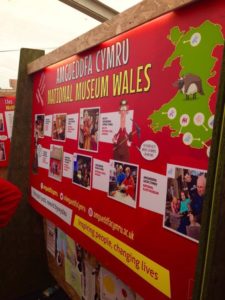
Rydym yn cefnogi aelodau o’r cyhoedd i rhoi adborth ar y perthnasau gyda Amgueddfa Genedlaethol Cymru a traddodiadau diwylliannol.
We are supporting members of the public give us feedback on the relationships with Wales National Museums and Cultural traditions.
Owain Rhys yn siarad bach am @AmgueddfaCymru ag @Urdd #urdd2016 pic.twitter.com/luavOZmb6A
— GetTheChance (@GetTheChance4U) June 2, 2016
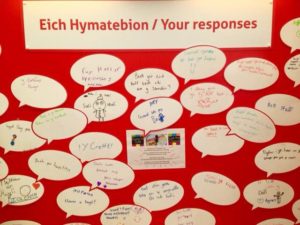
Rydym hefyd yn rhannu adborth ar yr Eisteddfod ei hun.
We are also sharing feedback on the Eisteddfod itself.
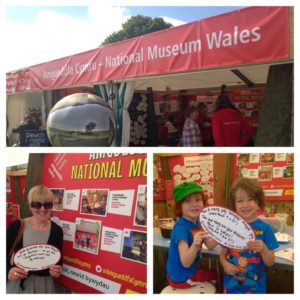
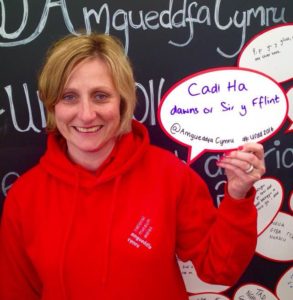

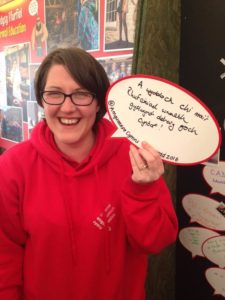
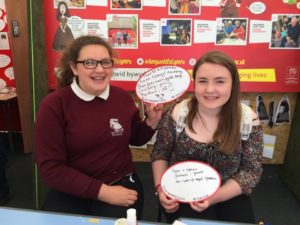
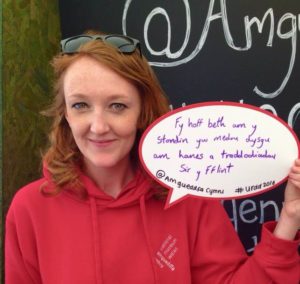
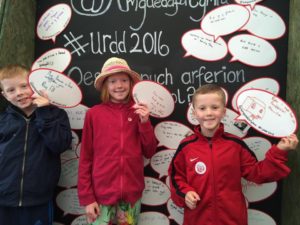
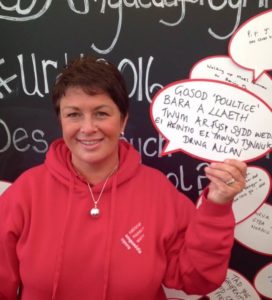
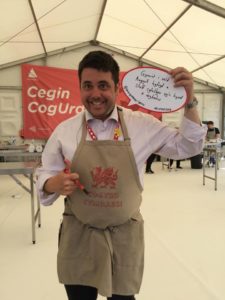
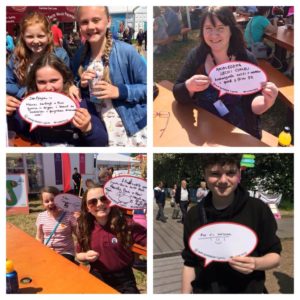

Menter gymdeithasol wedi’i leoli yn Ne Cymru yw Dyma’ch Cyfle, yn gweithio tuag at greu cyfleoedd i amrywiaeth o bobl sydd am brofi ac ymateb i chwaraeon, celfyddyd, diwylliant a digwyddiadau byw
- Mae Dyma’ch Cyfle’n arddangos gweithgaredd ar wefan cylchgrawn ar-lein getthechance.wales/
- Mae’r wefan yn cynnwys gweithgreddau gweithdy, adolygiadau, erthyglau golygyddol a llawer mwy
- Mae’r wefan yn blatfform i’n haelodau i rannu, trafod a gwerthuso eu hymatebion personol gyda’u rhwydweithiau a’r byd ben baladr
- Dyma’ch Cyfle yw’r gymdeithas sy’n cynrychioli aelodau Beirniaid Ifanc Cymru, Beirniaid Cymunedol Cymru a 3ydd Act
Digwyddiadau ar stondin Amgueddfa Cymru, Eisteddfod yr Urdd Fflint 2016
Dydd Mercher, 1 Mehefin 11:00 – Gweithdy Beirniadu gydag Aneirin Karadog
Dydd Iau, 2 Mehefin 10:30, 12:00, 14:00, 15:00 – Gweithdai Beirniadu Dyma’ch Cyfle
Get The Chance is a social enterprise based in South Wales, working to create opportunities for a diverse range of people to experience and respond to sport, arts, culture and live events
- Get The Chance uses its online magazine website getthechance.wales/ to showcase its activity
- The website content will feature workshop activity and outcomes, reviews, editorial features and much more
- Our website is a platform for our members to share, discuss and evaluate their personal responses with their networks and the wider world
- Get the Chance is the host organisation for members of Young Critics Wales, Community Critics Wales and 3rd Act Critics
Activities on Amgueddfa Cymru-National Museum Wales’s stall, Urdd Eisteddfod 2016
Wednesday, 1 June 11:00 – Critic Workshop with Aneirin Karadog (Welsh language)
Thursday, 2 June 10:30, 12:00, 14:00, 15:00 – Get a Chance Critic Workshops (Bilingual)
Review Treasures National Museum Wales by Lois Arcari
Young Critics, 3rd Act Critics and Kids in Museums volunteers are working in collaboration with Amgueddfa Cymru – National Museum Wales (ACNMW) http://www.museumwales.ac.uk/ on a new free project focusing on the quality and standards of exhibitions and programming at their sites across Wales. Those involved recently spent a day with the staff at the National Museum, Cardiff. The response below is from Young Critic Lois Arcari.
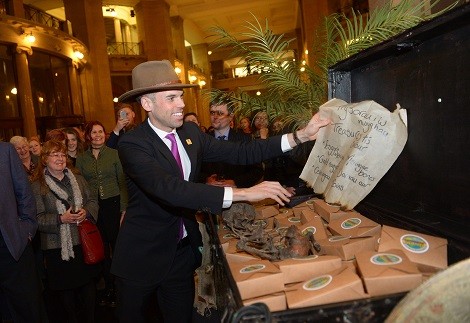
Ken Skates The Deputy Minister for Culture, Sport and Tourism at the launch of Treasures
The debates we have as part of our union with the Welsh National museum always prove that our combined aim – to make museum culture as interactive as possible, is one that only needs to be brought out and shared – our observations and opinions as immediate, magnetic and dynamic as with any other medium, the background stories to the exhibits on display are equally as fascinating.
Promoting museum culture as one that is inclusive, rather than exclusive, and more actively evolving than you may first think, is precisely why we’re part of these regular events.
Last week marked the start of another insight into widening public appreciation and interaction, and general museum culture; all hinged upon the new Treasures: Adventures in Archaeology exhibition.
This is the recently erected exhibit promising a bold new direction for the museum, one centred on a family orientated entertainment experience to become an inspiring gateway into museums for those unlikely to normally attend, was the promised fulfilled?
Well, that was the central topic of debate, with many insights and observations thrown into the mix.I feel that ultimately, it was mis-marketed. With unprecedented attention being given to the museum exhibit – an article on Walesonline not generally seen as par for the course – the focus was on the concept of Indiana Jones, on a new trail blazed for a new audience. The exhibit showed symptoms of both how quickly it was made, in relative time, and of the many debates behind the scenes on focus – areas such as participation offset by traditional ideas all very interesting, but not on the minds of families setting foot into the space. Unfocused seemed to be the prescriptive word, with minimal interaction – tentatively promised to be rectified – offset against rather standard pieces. The real highlights of the exhibit – a scan of the entombed mummy, and the stories behind the objects seemed to get lost in an odd traditionalism offset against a brilliantly atmospheric design.
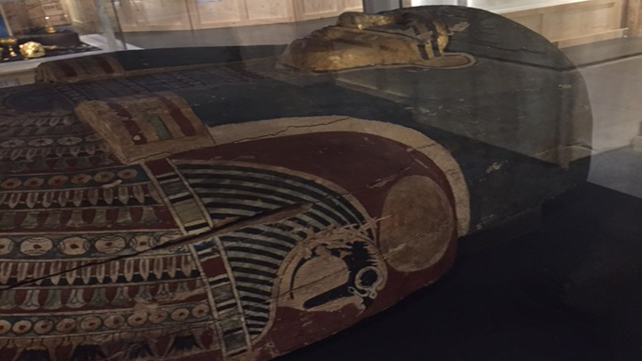
The objects were all interesting, but there seemed to be minimal coherence – some objects more easily appealing to adults than children, some with minimal information, others with information that was hard to access, hidden in corners, or betrayed by font, for example. Everything seemed almost annoyingly tantalising – this far and no further – emphasized by the size of the exhibition.
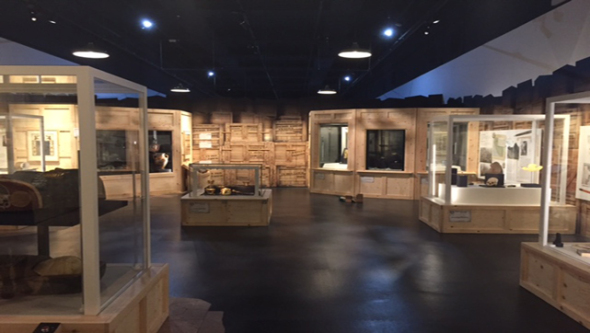
In the meeting afterwards with museum staff and participants, there were many discussions about colonialism and just what the word treasures meant; to the general public, museum staff, parents and children. Whilst there was discussion of introducing an alternative way of thinking about archeology as less moral than we’d first suspect, I think that would be at a rather painful odds with the Indiana Jones theme, and that suggestion towards these ideas, rather than any preaching, would be a great way to make children feel more involved and respected and introduce a different way of thinking. With a different focus the exhibition could be wonderful – but it seems like a forced response rather than an organic commitment to criticism of museum culture, and the marketing focusing on the film seems to be playing it up rather too much, though to its credit the museum itself does seem a lot more balanced with the marketing.

As it stands, with a discussion into some of the rich and fascinating cultures, and the ethics of archeology, the exhibit could be decent for a young fan of the time period, rather than of the franchise attached. Add in more transparency about the volunteers roles, and a chat with them, and the exhibit will be mined for its worth. With a hefty price tag attached, this seems to be a misconceived remarketing of old ideas and old pieces rather than the new push it promised, and unless a family has prepared for the day out with discussion and research or wants a new angle on a school topic, and is prepared for some hard work getting the most out of the exhibit, it seems a tad misleading.
The Museum Critics An insight into National Museum Cardiff by Amelia Seren Roberts
Young Critics, 3rd Act Critics and Kids in Museums volunteers are working in partnership with Amgueddfa Cymru – National Museum Wales (ACNMW) http://www.museumwales.ac.uk/ on a new free project focusing on the quality and standards of exhibitions and programming at their sites across Wales. Those involved recently spent a day with the staff at the National Museum, Cardiff. We will be featuring the responses to the day from the participants our last response is from artist Amelia Seren Roberts.
This blog post is reproduced from Amelia’s original blog which can be found at
AMELIA SEREN ROBERTS: IVOR DAVIES AND DESTRUCTION IN ART –
At the Natio… http://ameliaseren.blogspot.com/2015/12/ivor-davies-and-destruction-in-art-at.html?spref=tw
IVOR DAVIES AND DESTRUCTION IN ART
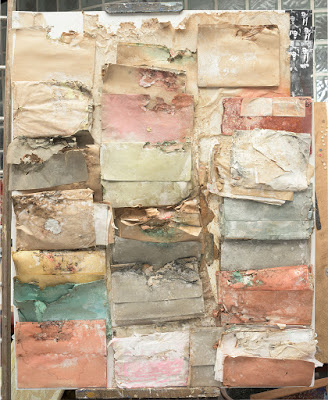
At the National Museum of Wales.
Curated by Judit Bognor.
I recently attended a tour of the Ivor Davies retrospective hosted by Judit Bognor, co-curator of the exhibition and tutor on the MFA at Cardiff School of Art & Design.
Judit began by explaining that the show was a solo show, rather than a group exhibition. In terms of curatorial practice, if the show is to contain different works by a group of artists, a topic or theme may be chosen before or after the exhibiting group is decided.
In this case, NMW was to show a retrospective of Ivor Davies’ practice. It is unusual for a gallery or museum to show a single artist’s work unless they are well-established.
The usual format of such retrospectives is a chronological one, starting at the early works and ending at the newer works; the intention of such is to show the development of an artists practice throughout their career. Other, non-chronological, approaches to displaying the pieces may include grouping by topic or materials.
In the case of Ivor Davies’ exhibition, the works are shown in reverse-chronological order, starting at the most recent works, and developing to focus on more early examples. The freedom Judit was allowed to curate with was partially due to the artworks being largely sourced from outside collections. When an artwork is in a permanent collection, the owner has say over when, where and how a work is presented, as such the curators input may be limited.
Judit drew attention to the relationship that exists between the artist, curator and institution when organising exhibitions. She spoke of the conflict often experienced between the ideas of the curator, the artist’s intentions for the work, and the institutional context.
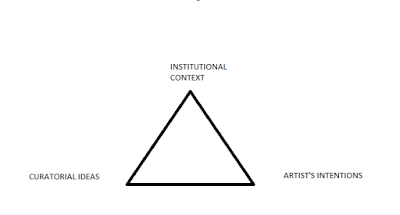
Judit expanded on the reasoning behind the title of the exhibition; a common thread that her colleagues and herself had recognised within the work over the whole of the artist’s career was that of destruction and creation, material transformation, and of durational thought. This was evidenced in works that developed during a symposium Ivor co-organised in the Sixties on the topic of destruction in art. Works related to the theme, as well as an archive of over 300 documents are shown alongside informative texts.
What interested me about the consistent theme of this exhibition was its relevance to a contemporary political context. A large number of the works having been created around the time of the Cold War, when the risk of nuclear devastation was a very real threat, the questions the works raise about destruction seem all the more poignant. Whether a deliberate comment or not, the timing of the exhibition, which coincides with Britain currently seeming on the brink of conflict, means that its concerns have become relevant once more.
It is important when considering whether an exhibition and the specific works within it require accompanying texts, the establishment within which the works are shown. It is more likely that simple, explanatory text in large print would be seen alongside works in a public museum, than would in a contemporary art gallery. This is because the curator must consider whether such interventions are appropriate in the context of the work and venue, and within this must select written supporting materials which suitably reflect the varying interests and academic capabilities of the reader. In this case, because the exhibition is sited at the National Museum of Wales in Cardiff, the audience is varied in age, ability and interests and thus large, simple explanatory text is appropriately shown in each room, whilst smaller texts are shown alongside specific works should the viewer choose to engage with the show in more depth. It is the viewer themselves in this case who decides their individual level of interaction with the show.
An interesting question thrown up by the curation of the exhibition is of how the viewer might experience a performance durationally. In this case, the curator has chosen to display a video recording of the performance, as well as a re-staging of one performance itself. Alongside this, an archive of materials surrounding the performance are exhibited which detail documentation of the memory of the event, instructions (or scores) for the performance, sketches and other ephemera.
Judit spoke briefly about the difficulties the team had experienced when considering how best to re-stage a historic performance in a contemporary setting. This is a topic that I have discussed once before whilst at the New Walk Gallery in Leicester, following their purchase of a performance piece by contemporary artist, Marvin Gaye Chetwynd. The difficulties in the conservation, and re-staging of a performance piece (especially a historic example) lie in the inability of the curator or institution to ever accurately re-create the exact context in which the work was first performed. Judit has approached this, whilst in conversation with the artist, by following the original scores of the performance, whilst adapting a proportion of them to fit more appropriately in to a museum context. Working in this way raises interesting questions about where the artwork exists and whether a performance work can ever truly be recreated or owned.
For me, the highlights of the exhibition include a painting by Ivor Davies which invites the viewer to ‘Ysgrifennwch graffiti prioddul ar fur y capel gyda’r sialc sydd yma’ (Write graffiti on the side of the chapel with the chalk); and in the archive, a darkly humorous newspaper article written by Robin Page entitled ‘Death and Art’ which cynically reports on an artform which involves the expressive act of stamping frogs to death whilst wearing a silver jumpsuit.
To see more information about the show, please visit the National Museum Wales, or take a look at their website here.
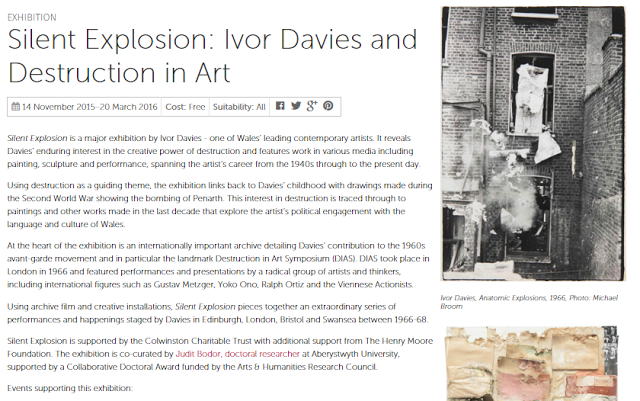
The Museum Critics an insight into National Museum Cardiff by Lois Arcari
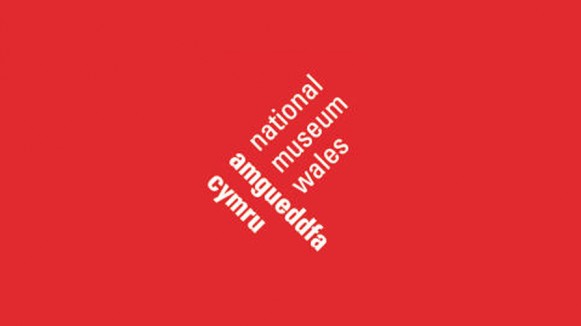
Young Critics, 3rd Act Critics and Kids in Museums volunteers are working in partnership with Amgueddfa Cymru – National Museum Wales (ACNMW) http://www.museumwales.ac.uk/ on a new free project focusing on the quality and standards of exhibitions and programming at their sites across Wales. Those involved recently spent a day with the staff at the National Museum, Cardiff. We will be featuring the responses to the day from the participants over the next few days, next up Young Critic, Lois Arcari.
Death of the Author – all great works must bow to it, to be thought as of such.What about great places, prompting great memories and passions? Response breaths life to art, in quiet thought and idle conversation just as much as any great debate. The spectator as creator needs to be accepted…. are they?
This is what the Young Critics, Kids in Museums and 3rd Act Critics teamed up to discuss this previous weekend, in the beautiful National Museum, Cardiff, looking at completely contrasting exhibits to try and form a coherent narrative on why and how museums deserve to grow, with accessibility and increased open dialogue in mind.The day pointed out diversity spectacularly in both exhibits and response.
The new and hotly anticipated ‘Treasures: Adventures in Archaeology’ exhibition, with props and inspiration from the Indiana Jones franchise certainly aims to tear down any expectations of the fusty and austere in modern museums.
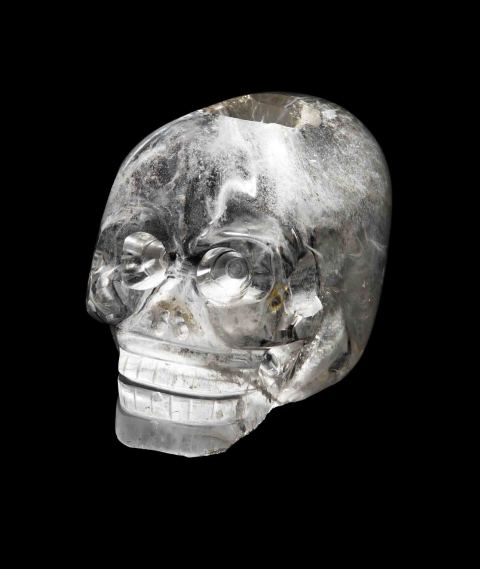
Crystal Skull. Photograph © Musée du Quai Branly, Dist. RMN-Grand Palais / Patrick Gries / Valérie Torre
http://www.museumwales.ac.uk/cardiff/whatson/8641/Treasures-Adventures-in-Archaeology/
How far can one exhibit go – even with a much-loved film series behind it? It remains to be seen, debuting in January 2016 as a priced exhibition for the museum. Even cynics must admit the reaction it gets will certainly be as very interesting as it’s spectators are interested. And, as everyone shall be pleased to hear, actively sought out as well as listened to.
Luckily, the two exhibits we saw, in the fresh and present, offered a beguiling contrast, from the geology and maps of William Smith to the gleefully anarchic meditations on destruction of Ivor Davies. Practical concerns were made – volume, fonts size, positioning, as well as the more abstract – how to make sure potentially dry subjects could prove to compel people outside of their specialism, and how the more obviously popular could lead onto the obscure, and be given equal fervour. Each were enticing for different reasons, my personal favorite the expansive Davies exhibit, hinged on a universal themes, explored in different, and all intriguing facets – the maps were harder to match up to, the direction of pull for the general public unclear, the room itself as liable, before exploration, to feel cold as calm and contemplative.
The central humanity of each exhibit, thematically or narratively, with Smith the heroic everyman was a draw to each critic, all agreeing to it as the sometimes hidden central selling point of any exhibition, the lives behind the art being enlightened preventing any feelings of imposition.
Discussion was ever encouraged and enlightened, the real, vested interest palpable. Museums that care as much about their audience as artists as the linear type are destined to survive any challenges, and this day, and what was shown through it, were brilliant examples.
Exciting new project with Young Critics/3rd Act Critics and Amgueddfa Cymru – National Museum Wales
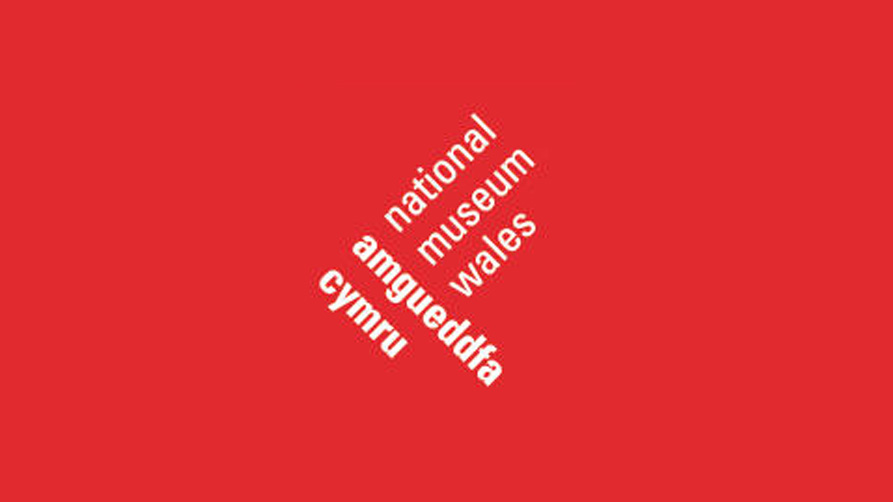
Young Critics and 3rd Act critics are working in partnership with Amgueddfa Cymru – National Museum Wales (ACNMW) http://www.museumwales.ac.uk/ on a new free project focusing on the quality and standards of exhibitions and programming at their sites across Wales.
ACNMW are keen to generate feedback and data from interested visitors regarding what makes a good exhibition and programme. The project aims to make the work of museums more accessible to the general public and increase the reach of culture and heritage. The project may also focus on Cadw sites and local museums and galleries.
The project is expected to last for 6 months initially, before being reviewed, and participants will be expected to commit to the lifetime of the project. Staff at National Museum Wales will provide training and workshops, and exclusive expert guidance on their roles. All participants will be supported in critical response methods and use of digital technologies to develop critical thinking skills.
The first workshop will take place on Saturday the 5th of December 10-1pm at National Museum Cardiff, Cathays Park, Cardiff CF10 3NP.
If you aged between 12-25 or 50+ and would like to be involved please contact project coordinator Guy O’Donnell on odonnell.guy@gmail.com



